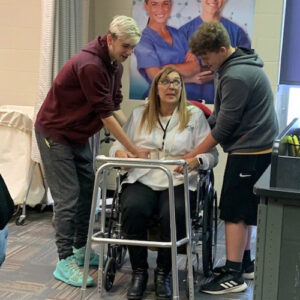success story
Woodland Regional Technical Academy: Boosting Rural Education
Forging community college ties
Northern Wisconsin school districts seek partnership
Educational and career opportunities are often limited for students in rural areas. To level the educational playing field for rural Wisconsin youth, representatives of Northeast Wisconsin Technical College teamed up with local school districts to provide supplemental classes to area high school students. The goal was to provide college-level experiences and training that could give students a jump-start toward a successful career.
 The Woodland Regional Technical Academy is formed
The Woodland Regional Technical Academy is formed
Northeast Wisconsin Technical College formed a partnership with leaders of the Florence County, Niagara, Beecher-Dunbar-Pembine, and Goodman-Armstrong Creek school districts. A regional industry advisory council, representing more than a dozen area businesses and supporters, joined the planning process. The Woodland Consortium was formed, and a former elementary school in Aurora was chosen as the site for the Woodland Regional Technical Academy. Students would be able to earn both high school and college credits in fields such as electromechanical technology, welding and health care, and could learn how to start their own businesses. The site already housed some of the technical college’s classes as well as the Woodland Kitchen and Business Incubator.
Job skills for students and adults
The Woodland Regional Technical Academy was established as a program of Northeast Wisconsin Technical College. The challenging curriculum helps build students’ confidence for success in college and careers. In some cases, students conclude their classes with a job already in hand. The learning center also provides training and courses for adults making career transitions in northern Wisconsin and in Michigan’s Upper Peninsula.
Watch this video to hear how students give enthusiastic marks to the program.
“We’ve had quite a few success stories. Students went on to NWTC and graduated early because they already had credits under their belts, and they had jobs lined up when they graduated.”



